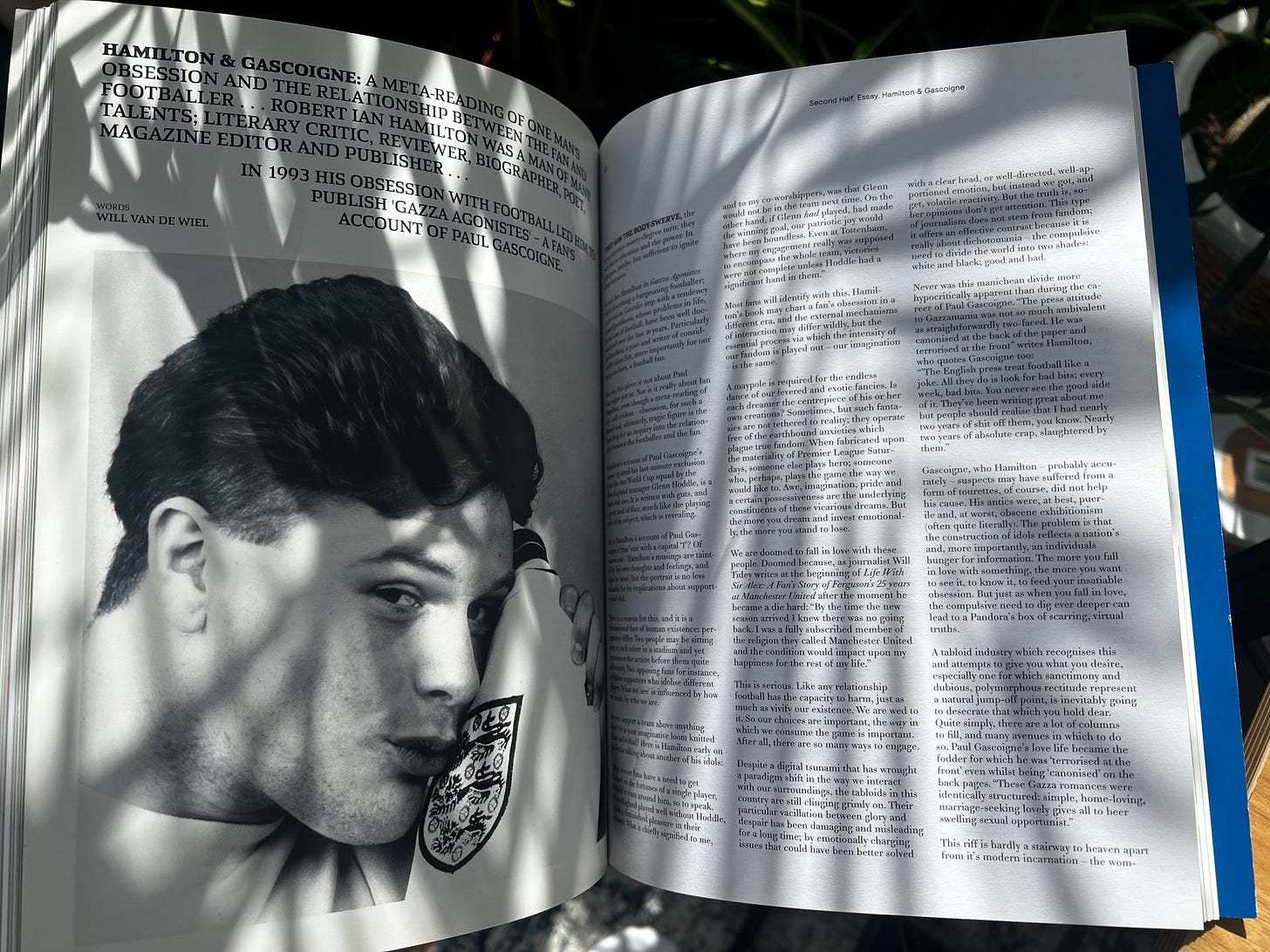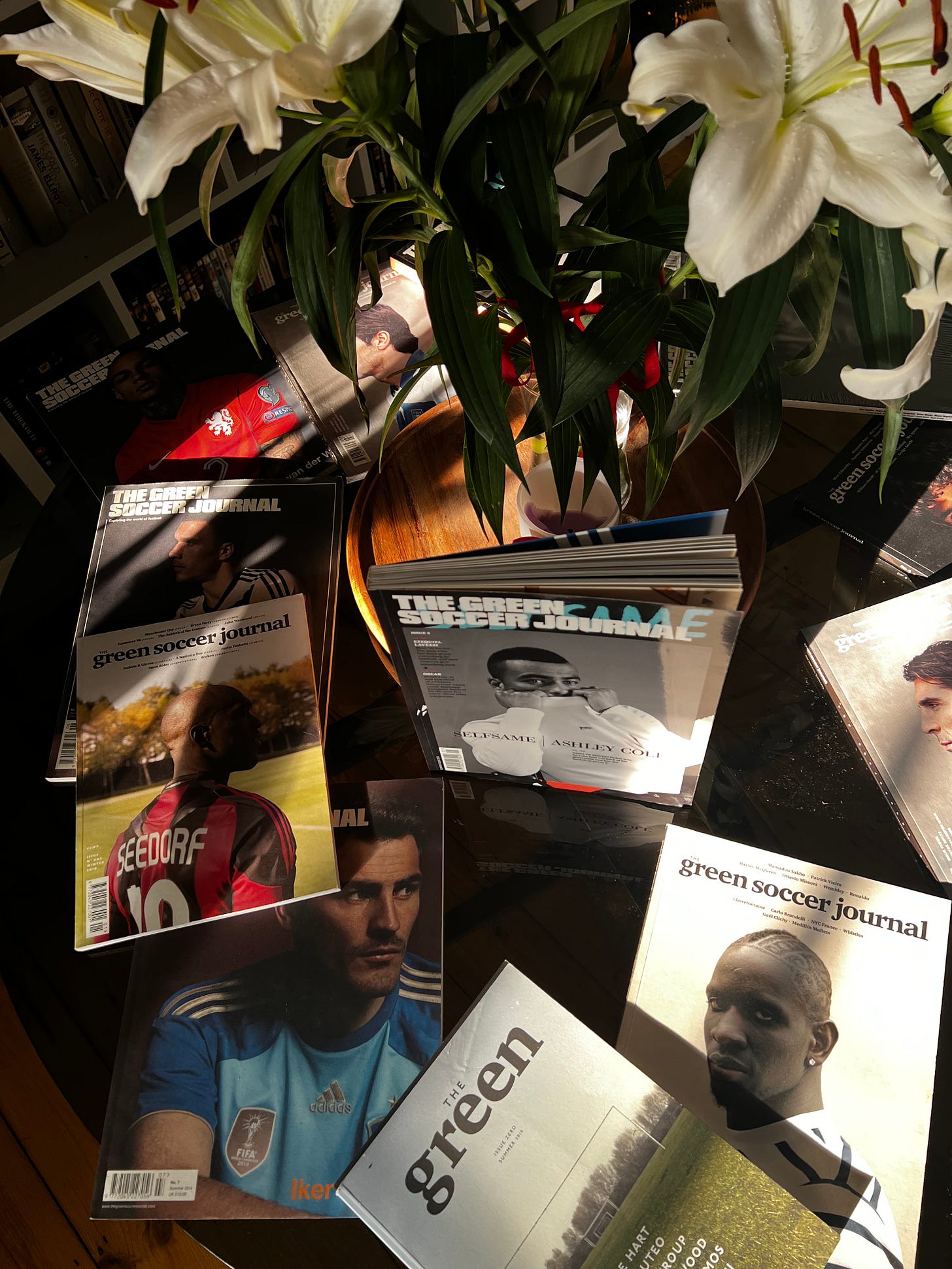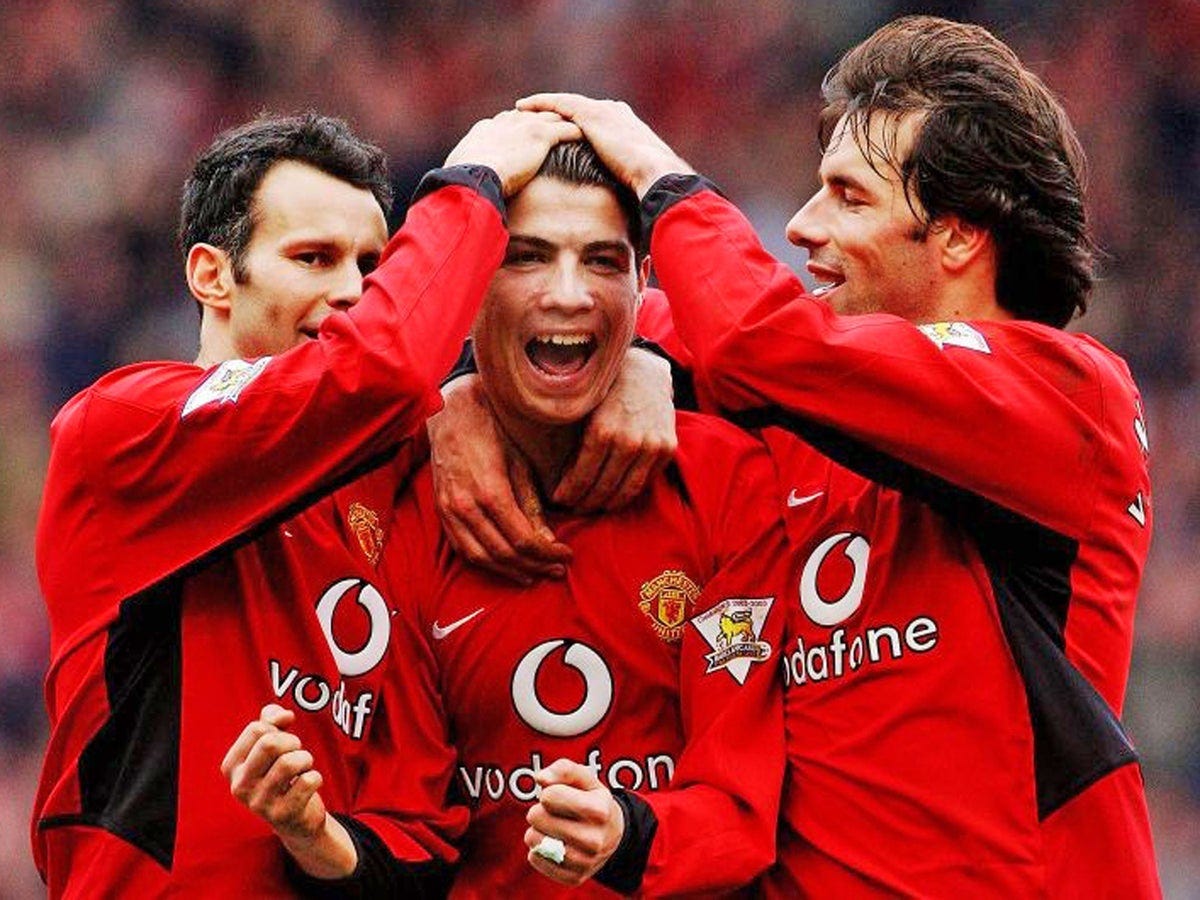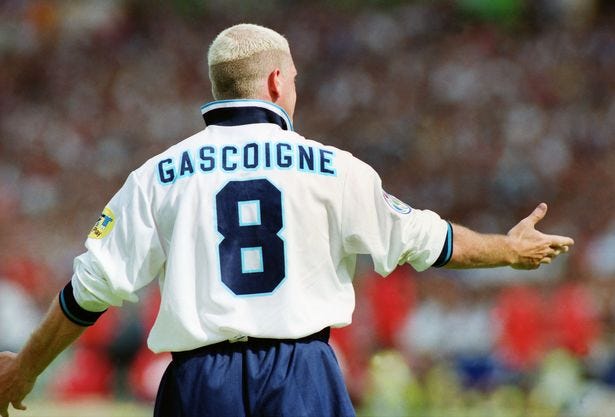This article originally appeared in Issue 5 of The Green Soccer Journal. Summer 2013.
They saw the body-swerve, the on-a-sixpence ninety-degree turn; they saw the acceleration and the power. In glimpses, maybe, but sufficient to ignite their fantasies.
So says Ian Hamilton in Gazza Agonistes when describing a burgeoning footballer; a precocious Geordie whose problems, in and out of football, have been well documented over the last 20 years. Particularly by Hamilton, a poet and writer of considerable talent but, more importantly for our purposes here, a football fan.
You see, this piece is not about Paul Gascoigne per se. Nor is it really about Ian Hamilton, even though a meta reading of his - self-evident - obsession for such a flawed and, ultimately, tragic figure is the backdrop for an inquiry into the relationship between footballer and fan.
Hamilton's account of Paul Gascoigne's career up until his last-minute exclusion from the 1998 World Cup squad by the then England manager Glenn Hoddle, is a heart-felt one. It is written with guts and a great deal of flair, much like the style of its subject; which is revealing.
But is Hamilton's account of Paul Gascoigne a 'true' one with a capital 'T'? Of course not - Hamilton's musing are tainted by his own thoughts and feelings, by what he sees, but the portrait is no less valuable for its implications about supporter and idol.
There is a reason for this, and it is a fundamental fact of human existence: perceptions differ. Two people may be sitting next to each other in a stadium and yet experience the action before them quite differently. Two opposing fans for instance, or fellow supporters who idolise different players.
What we 'see' is influenced by how we think; by who we are.
Do you support a team above anything else? Or is your imaginative loom knitted to an individual?
Here is Hamilton early on in Gazza:
Most soccer fans have a need to get hooked on the fortunes of a single player, to build a team around him, so to speak. When England played well without Hoddle, I took a diminished pleasure in their triumph. What it chiefly signified to me, and to my co-worshippers, was that Glenn would not be in the team next time. On the other hand, if Glenn had played, had made the winning goal, our patriotic joy would have been boundless. Even at Tottenham, where my engagement really was supposed to encompass the whole team, victories were not complete unless Hoddle had a significant hand in them.
Most fans will identify with this. Hamilton's book may chart an obsession in a different era, and the mechanisms of interaction may differ wildly, but the essential process via which the intensity of our fandom is played out - our imagination - is the same.
A maypole is required for this endless dance. Is each dreamer the centrepiece of his or her own creations? Sometimes, but when fabricated upon the materiality of Premier League matches, World Cups and European Championships, someone else plays hero.
Someone who, perhaps, plays the game the way we would like to. Wish fulfillment, pride and identity are the underlying constituents of these dreams. But the more you invest emotionally, the more you stand to lose.
We are doomed to fall in love with these people. Doomed because, as journalist Will Tidey writes at the beginning of Life With Sir Alex: A Fan's Story of Ferguson's 25 years at Manchester United about the moment he became a die hard:
By the time the new season arrived I knew there was no going back. I was a fully subscribed member of the religion they called Manchester United and the condition would impact upon my happiness for the rest of my life.
This is serious.
Like any relationship football has the capacity to harm as much as vivify. We are wed to it - at the mercy of results at least once a week. So our choices are important, the way in which we consume the game is important.
Despite a digital tsunami that has wrought a paradigm shift in the way we interact with our surroundings, the tabloids in this country are still clinging grimly on. Their particular vacillation between glory and despair has been damaging and misleading for a long time.
But the truth is, nuanced opinions don't get attention. This type of volatile journalism does not stem from fandom; it offers an effective contrast because it is really about dichotomania - the compulsive need to divide the world into two shades: white and black; good and bad.
Never was this manichean divide more apparent than during the career of Paul Gascoigne.
“The press attitude to Gazzamania was not so much ambivalent as straightforwardly two-faced. He was cannonised at the back of the paper and terrorised at the front,” writes Hamilton, who quotes Gascoigne:
The English press treat football like a joke. All they do is look for the bad bits; every week, bad bits. You never see the good side of it. They’ve been writing about me but people should realise that I had nearly two years of shit off them, you know. Nearly two years of absolute crap, slaughtered by them.
Gascogine, who Hamilton suspects may have suffered from a form of tourettes, of course did not help his cause. His antics were at best puerile and at worst, obscene exhibitionism (often quite literally).
The problem is that the construction of idols reflects a nation’s - and so an indvidual’s - hunger for information. The more you fall in love with something, the more you want to see it, to know it, to feed your insatiable obsession. But just as when you fall in love, this compulsive need to dig ever deeper can lead to a Pandora’s box of scarring, virtual truths.
A tabloid industry which recognises this and attempts to give you what you desire with as many column inches as it can muster, especially one for which sanctimony and dubious, polymorphous rectitude colour every perception, is inevitably going to desecrate that which you hold dear.
Paul Gascoigne’s love life became the fodder for which he was ‘terrorised at the front’ even whilst being ‘cannonised on the back pages’.
These Gazza romances were identically structured: simple, home-loving marriage-seeking lovely gives all to beer-swilling sexual opportunist.
This riff is hardly a stairway to heaven apart from its modern incarnation - the womanising young multi-millionaires, ‘love rats’, lurid tales of ‘gangbangs’ and ‘roastings’.
But then, these actually happen, don’t they? Never mind the moral hypocrisy of most tabloid reporting, the brute fact of 21st century footballers is that a large proportion of them are callow youngsters with a dearth of interests outside the sport, a vacuum easily filled, and monstrously distorted, by the trappings of fortune, fame, and the vanities and conceits which inevitably follow.
In the case of Hamilton and Gascoigne, it’s easy to infer from reading his book that part of the sentimentality he cannot conceal towards the Geordie rogue regarding the more outlandish and indefensible aspects of his nature, were borne of a realisation that his personality, his neurological tics, rendered him utterly ill-suited to a life in the public eye.
The problem is that, nowadays, the globalisation of the Premier League and the astronomical amounts of cash in the game are doing two things: 1. Ripping the clubs out of the hands of local communities, and 2. Creating a schism between footballers and fans on a personal and existential level.
It’s becoming harder and harder for most fans to identify with the new breed of hero, even before you get to the industries springing up around the sport.
Fantasy football has birthed a slow mutation of what is is to be a fan, by creating a game within a game. There is no player of it (providing they are a football supporter) who has not eventually felt the slow, insidious tug at their allegiances.
Instead of having the one champion who influences the way you watch the game, there are 11, and they're not all on your team, or even on the same side. You watch a game agonising not a missed chance but at a missed chance by that player.
You may even find yourself wishing that your team concedes a goal, merely to prevent a rival’s player keeping a clean sheet. Or that your striker doesn’t score, because you left him on the bench as a point of difference.
It's idolatry on crack; a fleet of individuals in the ironic setting of a team sport. One which has been feverishly embraced on social platforms.
It is impossible to inquire into the relationship between supporter and idol without mentioning the evolution and proliferation of social media; the ready accessibility of a world of opinion, often emboldened by anonymity, hitherto unvoiced.
Anger is its currency. And in football, where tribalism, jealousy, and venomous disappointment play a larger part than they ought, this bubbling cauldron of resentment frequently boils over.
It’s arguable the extent to which Twitter has had a toxic effect on the relationship between player and footballer, many have closed their accounts, yet there are plenty who feel that Twitter has made these footballers, so stratospherically distant in terms of status and income, more accessible, more, well, boringly real.
You can interact with them, mono et mono. Or should I say, anonymous malcontent to public content. Although given the vast discrepancy between anonymity and celebrity in the context of Twitter, and the PR teams pulling the strings, the greater intimacy often extolled between fan and player may be something of a chimera.
Perhaps the relationship between the two has been damaged by social media rather than buttressed by it. Perhaps the dreamscapes of fans in bygone eras were richer, more intense, more vivid and more emotionally invested because a blank slate is a far better tool for the imagination than the petty, dull, repetitive bleatings of your favourite centre forward on Twitter.
Is it not true that once you remove the mystique from something you unconsciously withdraw from it?
“Appreciation is a wonderful thing” as Voltaire once wrote, “it makes what belongs to others belong to us as well”.
But there is a relationship of diverging equity at work here: sometimes the overexposure of something or someone you hold dear makes it less personal and so, less special.
Let me give you an example.
As a fan, I have protected flair; I have a soft spot for flamboyance. I had a sneaking affection for Cristiano Ronaldo when he first signed for Manchester United, and I don't even support them. I suppose I loved his skill and irrepressible desire to entertain.
His physique was a far cry from the formidable structure it has become, and without that raw strength, and because of his lanky frame (in direct contrast to Lionel Messi's low center of gravity) he had to use a lot more artifice, theatricality and pure skill to get past people. But he was too unpredictable for the centre forwards. They never knew what he was going to do next. And his over-indulgences earned him nicknames here: Showpony, fancy-dan and the like.
In fact, I remember once opining to a United fan on holiday, that Ronaldo would 'be bigger than Best' one day. He walked off, in disgust, without saying a word.
Fortunately, I was right. Ronaldo, along with Messi, ushered in the era of the modern goal-scoring wing-forward. But the second he was embraced by all, the second he lost his rawness, I lost something that I have never been able to get back.
Ronaldo's career is all the more laudable for the culture in which he chose to develop. As Hamilton describes the tenuous nature of Gazza's genius, so the conditions necessary for the development of creativity in this country have not yet been properly fostered. We view it as bad form to show off.
But part of what was so special about Gascoigne on the pitch was that he gave English men and women pride in the artistic. The media have historically made too much of our deficiencies in technique in comparison to other countries, who become deified examples of everything we ought to be, veering into a hyperbole just as harmful as it is instructive. But there is a wonderful passage in Gazza Agonsites where Hamilton perfectly encapuslates what having an idol who is from your own country can do for national self-esteem, during a description of the nation’s mood following Italia 90, the starting point for Gazzamania.
Noble is not a word that the back pages often have mush use for, but on this day it did not seem out of place. And we too have been ennobled. From the split second against Holland when an explosive pirouette took him through two startled Dutch defenders, Gascoigne had altered our expectations; he had even put a strain on our vocabulary. In that instant, we, as fans, moved up a league. At last and maybe just for once we had a player of world class - or rather a player who was not afraid to be world class, who could treat the Gullits and Van Bastens, the Baggios and Viallis, as if they were just another mob of big lads in some Gateshead school yard.
Too often now we hear the stories of hatred rather than genuine enchantment. But this is about the fan who lives and breathes every painful, glorious moment of an idol's career. About a fan who, acutely, feels the effect of each performance - the negative press, the Tweets, the chants, the rumours - who, as Hamilton says, must be robust:
I also like to pretend that such a fan must be equipped with unusual qualities of loyalty, persistence and fortitude in the face of accumulating set-backs. With a pop star or opera singer, when you turn up for a performance, you usually get more or less what you go to see or hear. With soccer heroes, there is no such guarantee, or even likelihood: each performer is a new ordeal; the better the performer, the more determined the other side to stop him doing what he's good at.
There is so much potential for disappointment. You get the sense when reading Gazza Agonistes that Hamilton was hurt by some of his country's treatment of Gascoigne; by what a waste it all was.
Hamilton once spoke about the need for 'maximum control and maximum suffering' in his poetry; a medium so much more aesthetically stylised than most, and his affection for Gascoigne - an unruly, tragi-comic figure but gifted with skills that mesmerised - makes perfect sense.
Not only that but there may be some parallels in their lives: both possessed talents greater than that of their peers, but were perhaps outstripped by them. Hamilton, who died from cancer in 2001, never really got the exposure or acclaim he merited.
And we all know what has happened to Gazza.
Even the postscript to Âgonistes - to include his volatile exclusion from England’s 1998 World Cup squad by Glenn Hoddle - alludes to the sense of poetic travesty felt by Hamilton.
It was a sorry ending. Would England have had a better world CUp if Gazza was playing? This is not quite the point: we wanted Gazza in the team not just for England’s sake. But yes, I think he would probably have made an imprtant difference in the slow-paced match against Romania. And he would certainly have scored in the shoot-out against Argentina (except that England would not have been playing Argentina if they had not lost to the Romanians). We’ll never know, of course. And this, perhaps, is what we most resent: Glenn Hoddle’s icy pragmatism has thwarted our hunger for, shall we say, the accidents of narrative. His was a prose decision and our disappointment, so we like to think, partakes of the poetic. Simply on aesthetic grounds, Gascoigne’s exclusion from the 1998 World CUp was a calamity.
Football’s growing influence in the nineties and noughties in England after Rupert Murdoch instigated its metamorphosis, was itself part of a catalyst for the shifting landscape of male modernity in wider society.
The relationship between supporter and footballer is synergistic. Without the spice boys at Liverpool and far more significantly, David Beckham, this country's notion of masculinity might still be doldrums of Men Behaving Badly-esque laddishness, lingering bigotry and boorish attitudes.
Even though, sadly, some vestigial elements live on in fans, the majority have been influenced. FHM was a cultural rite of passage for boys for about a decade after its 1994 rebrand, but it's tawdry influence has been on the wane for sometime as the masculinity it so unashamedly champions becomes increasingly out of sync with the society surrounding it.
Did Paul Gascoigne play any part in that?
The tears of a clown at Italia '90 certainly reflected the plaintive cries of a nation. And what we are really talking about here is the translation of the specific, to the general. In the eyes of the fan, this relationship is reversed - we find a way to make football personal, and construct our dreams upon it (read: them), even if what we see is fundamentally unreliable.
As Hamilton says at the very beginning of the book, after describing the first time he saw Gascoigne:
All of this, I am aware, sounds fanciful and is perhaps misremembered, written up. But if it is: well, that is the spectator's fate - we watch but in the end we have to guess. What I do know is that this was the day on which I became a Gascoigne fan-in-waiting, or in-hope.










